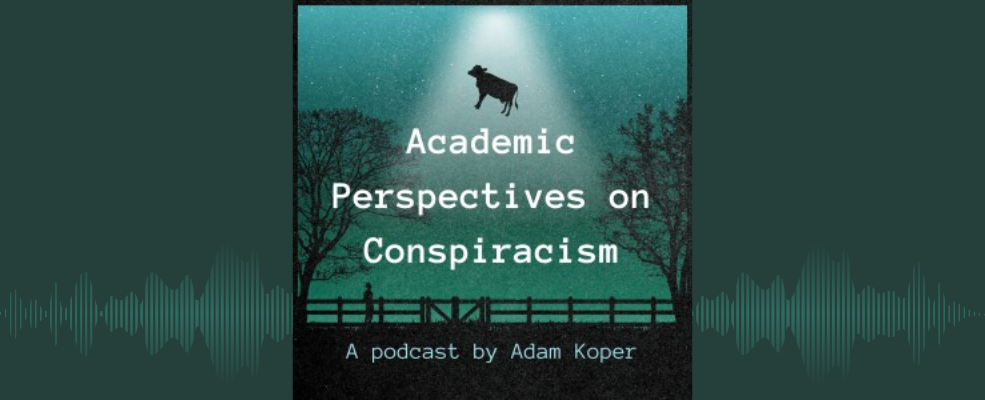Rwy’n gwrando ar lawer iawn o bodlediadau yn fy amser hamdden, ar bob math o bynciau – chwaraeon, athroniaeth, materion cyfoes, hanes – mae’r rhestr yn un hir. Mae’r rhan fwyaf o bodlediadau rwy’n gwrando arnyn nhw’n addysgol iawn, fel History Extra Podcast a’r New Books Network. Mae’r ddau ohonyn nhw’n dod ag ymchwil yn fyw trwy gyfweliadau gydag academyddion, gan weithio ar gymysgedd eclectig o bynciau – o hanes yr henfyd i wleidyddiaeth gyfoes. Mae’n rhai i mi ddweud, maen nhw’n gwneud dysgu yn hwyl.
Eleni yn ystod fy nghymrodoriaeth gyda Sefydliad Ymchwil Cymdeithasol ac Economaidd a Data Cymru, roeddwn i eisiau gwneud y gorau o’r cyfleusterau sydd ar gael yma yn sbarc|spark a rhoi cynnig ar recordio podlediad fy hun. Enw’r podlediad yw Academic Perspectives on Conspiracism — cyfres o gyfweliadau gydag ymchwilwyr sy’n astudio lle damcaniaethau cynllwyn mewn gwleidyddiaeth, diwylliant, a chymdeithas.
Dyma bwnc a astudiais yn fy nhraethawd PhD, ac un sydd wedi dod yn fwy pryderus yn ystod y blynyddoedd diwethaf gydag ymddangosiad QAnon yn yr Unol Daleithiau, damcaniaethau cynllwyn Covid-19, a’r defnydd o rethreg cynllwynio gan wleidyddion blaenllaw Prydain. Mae poeni am ddamcaniaethau cynllwyn a’u heffaith ar wleidyddiaeth yn gall, ond weithiau mae’r pryder yn troi i banig moesol. Felly, roeddwn i eisiau i’r podlediad roi golwg feirniadol a chynnil ar le damcaniaethau cynllwyn mewn cymdeithas, wrth dynnu sylw at yr ymchwil fwyaf cyffrous sy’n cael ei chynnal ar y pwnc. Yn bwysicaf oll, mae’r gyfres yn gyfle i rannu ymchwil hynod ddiddorol gyda chynulleidfa ehangach y tu hwnt i gyrraedd cyfnodolion a llyfrau academaidd arbenigol.
Un o’r pethau sy’n apelio mwyaf am ymchwil yn y maes hwn yw pa mor rhyngddisgyblaethol ydyw. Mae gan bron bob disgyblaeth yn y gwyddorau cymdeithasol, y celfyddydau a’r dyniaethau rywbeth i’w ddweud ar y pwnc, ac roeddwn i eisiau i’r podlediad adlewyrchu’r amrywiaeth hwn. Yn ystod y gyfres, siaradais ag ymchwilwyr sy’n gweithio ym maes gwleidyddiaeth, anthropoleg, astudiaethau llenyddiaeth, ac astudiaethau cyfryngau digidol.
Dysgais sut mae gwahanol ochrau sy’n gwrthdaro yn camddefnyddio naratifau cynllwyn, sut mae platfformau megis 4chan yn dylanwadu ar strwythur damcaniaethau cynllwyn, a pha mor ddadleuol yw’r cysyniad o ‘ddamcaniaethau cynllwyn’ mewn gwirionedd. Y wers bwysicaf rydyn ni wedi’i dysgu o’r sgyrsiau hyn yw nad yw damcaniaethau cynllwyn yn bodoli mewn gwactod – mae pob un yn cael ei ddylanwadu’n ddwfn gan y gymdeithas y mae’n datblygu ynddi. Er mwyn deall pam y gall y credoau rhyfedd hyn fod mor boblogaidd a phwerus, mae angen inni edrych ar ddylanwad gwleidyddiaeth, hanes a thechnoleg. Yn bwysicaf oll, mae angen inni chwilio am ffyrdd o ddatrys y problemau cymdeithasol y mae damcaniaethau cynllwyn yn aml yn manteisio arnyn nhw, megis anghydraddoldeb a phegynnu.
Gan ystyried yr ochr dechnegol, fe wnes i synnu fy hun trwy ddeall y broses recordio a golygu penodau yn gyflym, gyda chymorth hanfodol gan rai o fy nghydweithwyr yn WISERD. Roeddwn i’n falch o ddysgu, cyn belled â bod gennych chi feicroffon da a gofod tawel lle na fydd neb yn tarfu arnoch chi, bod recordio podlediad yn hynod o hawdd. Mae gallu Zoom i recordio sain galwad yn golygu mai dim ond ychydig o gliciau y mae’n ei gymryd i fynd ati. Roeddwn i’n disgwyl wynebu rhai anawsterau technegol yn hwyr neu’n hwyrach, ond er mawr syndod i mi aeth popeth yn hwylus a llwyddais i ganolbwyntio’n llwyr ar y sgyrsiau gyda fy ngwesteion. Yr unig anhawster go iawn oedd yn ystod y broses olygu. Roedd yn rhaid i mi wrando ar sain fy llais fy hun am oriau di-rif – a dyna lle roedd cael cydweithwyr i fy helpu yn ddefnyddiol!
Mae fy nghyngor i unrhyw ymchwilydd sy’n meddwl creu podlediad yn syml: rhowch gynnig arni. Gall creu podlediad fod yn ffordd wych o helpu eich ymchwil i gyrraedd cynulleidfa fwy y tu hwnt i feysydd academaidd. Peidiwch â gadael i’r dechnoleg eich rhwystro – cefais fy synnu gan ba mor syml yw recordio a golygu cyfweliad, ac ar wahân i bris meicroffon da, nid yw podlediad yn costio fawr ddim i’w greu.
Mae Academic Perspectives on Conspiracism ar gael nawr i’w wrando arno yn PodBean, Spotify, a YouTube.

